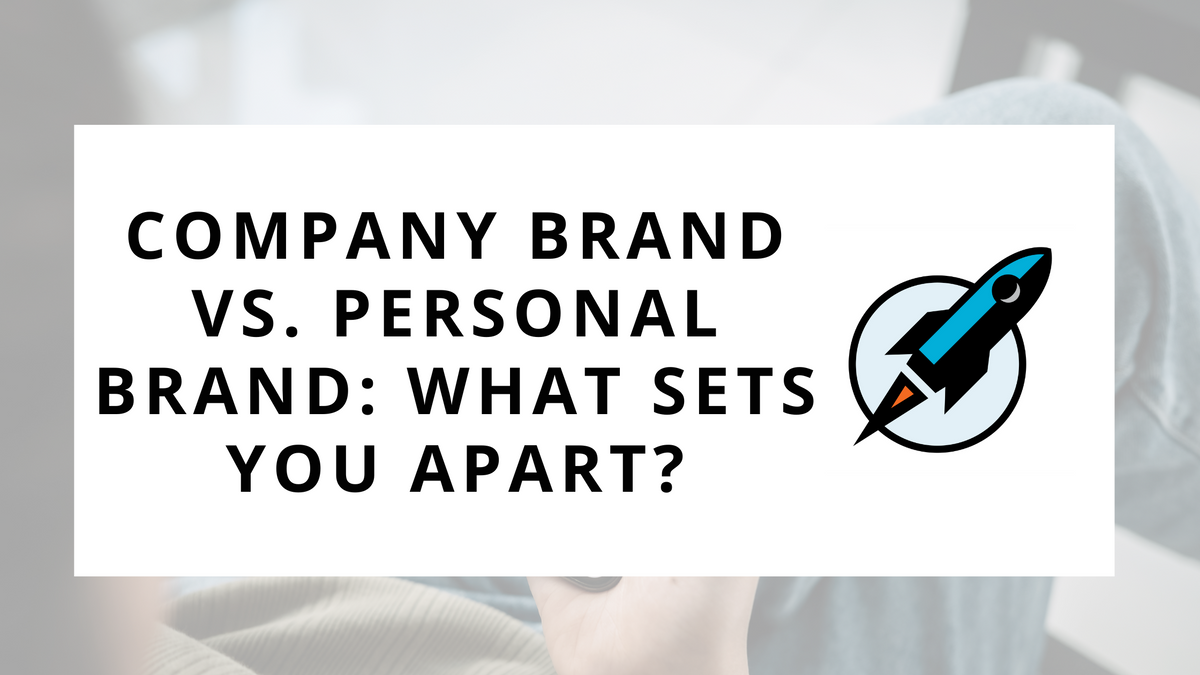Company Brand vs. Personal Brand: What Sets You Apart?

You’ve probably heard the suggestion to develop a “personal brand” before.
But what does that actually mean? And how is a personal brand different from a company brand?
In this week’s Sell with Social, we explore what it means to create a personal brand and how it differs from the company brand of your business.
What is a Brand, Anyway?
Let’s start by defining what a brand is more generally.
A brand is a multifaceted concept that encapsulates the identity, values, and reputation of a product, service, company, or individual. It is the sum of all the perceptions, emotions, and associations that people hold in their minds regarding a particular entity.
At its core, a brand represents a promise — a commitment to deliver consistent quality, experiences, and values to its audience.
This promise is conveyed through various means, including visual elements like logos and slogans, as well as the way a brand interacts with its customers and stakeholders through actions and content.
Personal Brand vs Company Brand
So how do we apply the concept of a brand to both a business and a person?
Conceptually, both company brands and personal brands are representative identities. However, they are distinctly different in practice.
A personal brand is the identity of an individual. Its foundation is in an authentic understanding of who a person is as an individual and a professional.
A company brand is the identity of an organization. It’s the combination of the marketing assets, products and services, and culture of a collective organization or business.

Despite both being “brands,” the goals and strategies of developing company and personal brands are very different. One is about positioning an individual as a trusted expert, and the other is about positioning an organization in a competitive marketplace.
Michael Jordan and the Bulls
Let’s look at a classic example of personal brand vs company brand… Michael Jordan and the Bulls.
The Chicago Bulls dominated the professional basketball scene in the 1990s. Winning six national championships, they were the team that everyone was talking about.
The Bulls brand was everywhere. Beyond their sports arena in Chicago, you’d see Bulls merchandise in every sports store across the country (and around the world).
But there was more than just the company brand of the Bulls - you also had the individual players on the team. You had players like Scottie Pippen, Dennis Rodman, and of course… Michael Jordan.

Michael Jordan has one of the strongest personal brands of any athlete of all time. A skilled basketball player, he was a driving force beyond the Bulls' domination of the NBA in the 1990s.
Not only did he help build the company brand of the Bulls team, but he also developed his own personal brand. The public got to know Michael for his basketball skills, personality, and ability to build a following.
Michael leveraged this personal brand to continue to further his career. Starting in movies, TV shows, and creating the iconic Nike Jordan shoe line. To this day, you’ll still see people wearing his iconic “23” jersey.
Personal and Company Brands Strengthen Each Other
Michael Jordan’s story is a perfect example of how personal and company brands can strengthen one another.
As a professional, your personal brand highlights your skills, expertise, and reputation. And if you have a strong personal brand, it’s likely going to not only serve you well, but your company as well.
Employers should seek employees who care about their personal brand. And it’s important to note that “personal brand” does not mean egotistical posturing, but somebody who genuinely provides value and maintains high professionalism.
A personal brand can unlock doors for more reach, higher authority, and ultimately drive increased revenue for a business (and the individual).
So while you may not be able to make game-winning free throws, you can host informative webinars, create engaging social media posts, or write educational blog posts.
Note: A common question I hear is - What if your company discourages you from building a personal brand? If this is you, it's time to find a new employer. Not only are they not supporting you as an employee, they are shortsighted in their company strategy as well.
7 Ways to Create Your Personal Brand
Creating a personal brand is a strategic and ongoing process that involves shaping how others perceive you.
Here are 7 ways to help you create and strengthen your personal brand:
- Define Your Brand Identity: Identify your core values, strengths, skills, and passions. What makes you unique? Understanding these elements is the foundation of your personal brand.
- Identify Your Target Audience: Determine who you want to reach and influence with your personal brand. Tailor your messaging and content to resonate with this specific audience. Create a customer persona document to outline your audience in detail.
- Build an Online Presence: Create and maintain a professional online presence through platforms like LinkedIn, personal websites, and social media. Use consistent branding elements (photos, messaging, color scheme) across these channels.
- Share Valuable Content: Consistently create and share content relevant to your niche. This could include blog posts, articles, videos, or podcasts that showcase your knowledge and expertise. You can take it a level deeper by doing speaking engagements, webinars, workshops, or contributing to industry publications.
- Engage and Interact: Actively engage with your audience by responding to comments, participating in discussions, and networking with others in your field. Authentic interactions help build relationships.
- Show Consistency and Reliability: Consistency in your messaging, behaviors, and visual identity reinforces your personal brand. Be reliable and deliver on your promises to build trust. People like brands because they are reliable.
- Be Authentic: Your personal brand should be a reflection of your true self. Live your brand values and maintain authenticity in all your interactions.

For this week’s action items, I want you to consider how you are developing your personal brand. How are you supporting your career and your company through your personal identity?
Take action on the following items:
- Define Your Brand - What makes you, you? Who is your audience, and what value can you bring to them? Building off of our digital sales framework, consider what kind of teacher you can be in your industry.
- Start Building Your Brand - Begin to build your personal brand by consistently showing up to your audience. Be intentional with how you’re using social media, content, and your networks to create your identity in the marketplace.
- Leverage Your Company Brand - Consider how you can leverage your company’s brand to improve your results. Can you be the trusted expert (personal brand) that delivers a great solution (company brand) to your customers? Think about ways to strengthen both brands at the same time.
More than anything, a personal brand is about taking ownership of your career. It’s putting yourself in the CEO position of “You Inc.”
